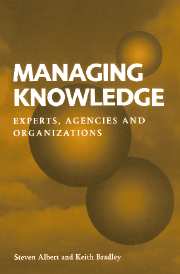Book contents
- Frontmatter
- Contents
- List of figures
- List of tables
- Introduction: the supply-side in context
- Part 1 Expert employees and their new organization
- Part 2 The labour market and the expert employee
- 7 AT&T's special employment policies for expert employees
- 8 An external temporary agency and expert employees
- 9 The Hollywood agency system
- 10 The Internet as an agent
- 11 Labour market segments re-examined
- 12 Agents and intellectual capital
- Appendix A Formal exposition of Winston model
- Appendix B Agency employment and search costs
- Notes
- References
- Index
8 - An external temporary agency and expert employees
Published online by Cambridge University Press: 23 November 2009
- Frontmatter
- Contents
- List of figures
- List of tables
- Introduction: the supply-side in context
- Part 1 Expert employees and their new organization
- Part 2 The labour market and the expert employee
- 7 AT&T's special employment policies for expert employees
- 8 An external temporary agency and expert employees
- 9 The Hollywood agency system
- 10 The Internet as an agent
- 11 Labour market segments re-examined
- 12 Agents and intellectual capital
- Appendix A Formal exposition of Winston model
- Appendix B Agency employment and search costs
- Notes
- References
- Index
Summary
It was a sight to behold Tim Linkenwater slowly bringing out a massive ledger and day-book, and, after turning them over and over and affectionately dusting their backs and sides, opened the leaves here and there, and cast his eye half mournfully, half proudly, upon the fair and unblotted entries.
Charles Dickens, Nicholas NicklebyThe temporary agency as a different organization
In part I we argued that organizations, like temporary agency employment, possess features which will benefit the expert employee. For the temporary agency we proposed in chapter 5, the availability of, and preference for, temporal control were described as a necessary prerequisite for a punctuated break away from the traditional organization. For AT&T the agency concept was internalized and, for various reasons we describe, cannot be considered a radical break but more a gradual adaptation and transformation of the traditional organization. We also suggest that the over-emphasis of demand-sided transformations of organizations, in theory and in empirical research, tends to neglect other important elements of job forms as preferred by the employee (for this case study, temporal control). This implies that conventional analysis of the gradual transformation of firms may result in erroneous conclusions about contemporary organizations such as temporary agency employment. We contend that temporary agency employment is an important sector of the expert employee labour market. This is partly because of the potential temporal flexibility that it can offer these individuals and partly because of its potential for networking and cross-fertilization of expertise. Whereas AT&T took centre stage in the previous chapter it is two London accountancy firms that provide the data for this chapter's analysis.
- Type
- Chapter
- Information
- Managing KnowledgeExperts, Agencies and Organisations, pp. 120 - 131Publisher: Cambridge University PressPrint publication year: 1997



